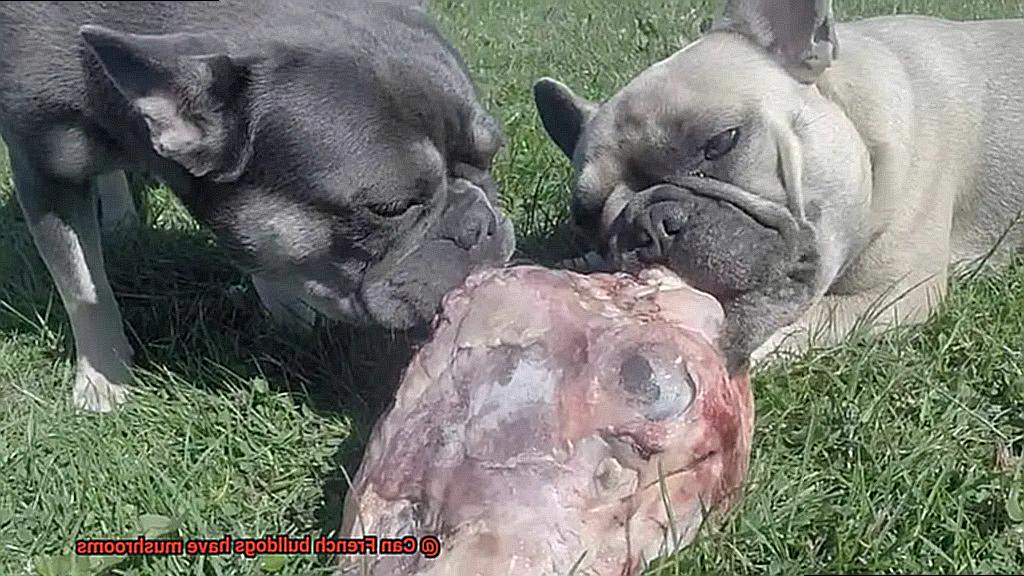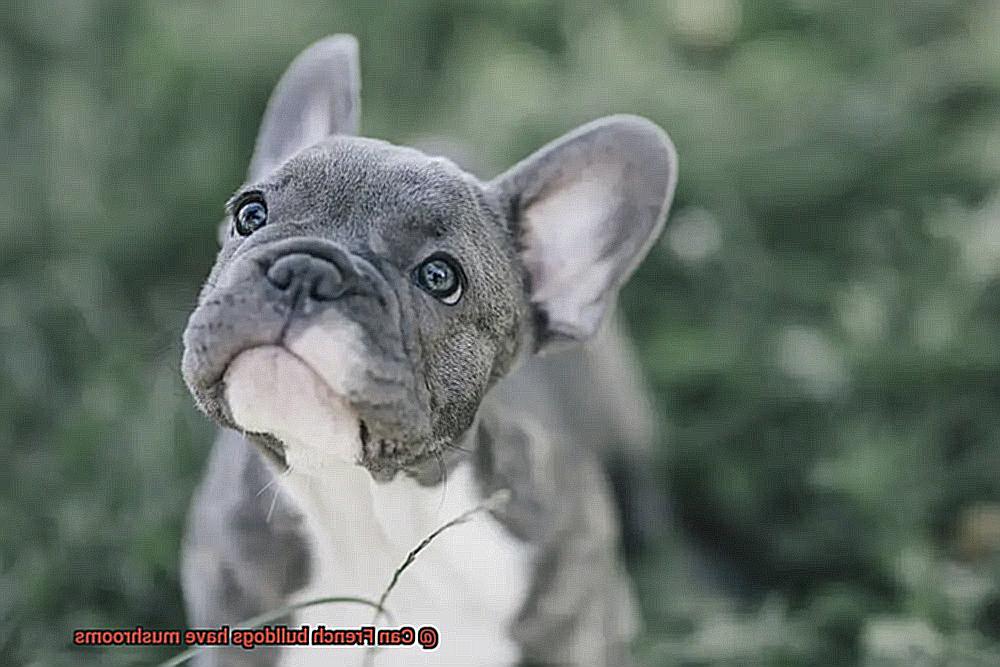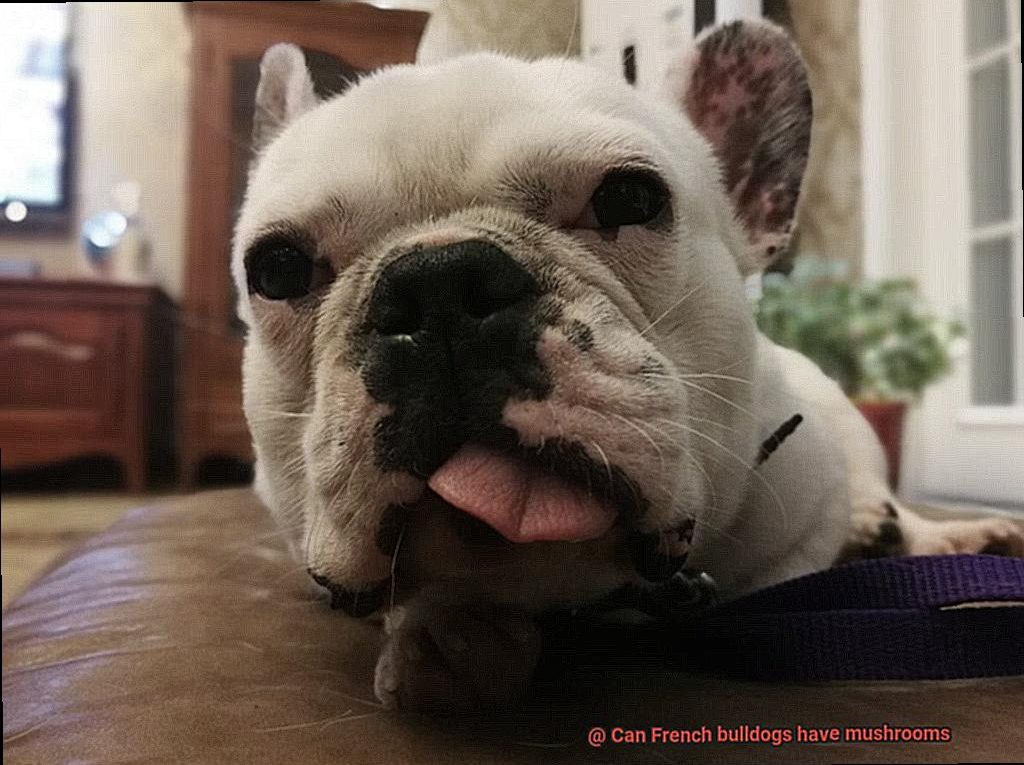Can French bulldogs have mushrooms?
When it comes to our beloved French bulldogs, their health and happiness are top priorities. As responsible pet owners, we must always be mindful of what we feed them. We’ve all heard about the dangers of chocolate or grapes for dogs, but what about mushrooms? It’s a question that often nags at concerned pet parents like an itch you just can’t scratch. Can French Bulldogs have mushrooms?
In this blog post, we’re going to dive deep into the mushroom mystery and uncover any potential health risks lurking beneath those fungi-filled surfaces.
So grab your favorite mug of steaming coffee, settle into your comfiest chair, and let’s embark on this enlightening adventure together.
What Types of Mushrooms Are Safe for French Bulldogs?
Contents
- 1 What Types of Mushrooms Are Safe for French Bulldogs?
- 2 Why Is It Difficult to Identify Toxic Mushrooms?
- 3 What Are the Risks of Feeding Mushrooms to French Bulldogs?
- 4 How Do I Know If My French Bulldog Has Eaten a Toxic Mushroom?
- 5 What Symptoms Should I Look Out For With Mushroom Poisoning?
- 6 How Can I Prevent My French Bulldog From Eating Toxic Mushrooms?
- 7 What Should I Do If My French Bulldog Eats a Toxic Mushroom?
- 8 Conclusion
When it comes to feeding our furry friends, there are certain foods that are safe and others that should be avoided. Today, we’ll be discussing mushrooms and their suitability for French Bulldogs. While mushrooms can be a tasty treat for us humans, not all varieties are safe for our four-legged friends. Let’s dive into what types of mushrooms are safe for French Bulldogs and why it’s important to exercise caution when introducing new foods into their diet.
Safe Mushroom Options for French Bulldogs:
When selecting mushrooms for your French Bulldog, it’s crucial to choose safe options that won’t harm their health. The following mushroom varieties are generally considered safe:
- White Button Mushrooms: These mushrooms are a popular choice due to their mild flavor and versatility. They provide essential nutrients such as potassium, vitamin B6, and folate.
- Cremini Mushrooms: Also known as baby bella mushrooms, these give a flavorful twist to your Frenchie’s meals. They offer similar nutritional benefits to white button mushrooms and can be a great addition to their diet.
- Portobello Mushrooms: With their meaty texture, portobello mushrooms can add variety to your French Bulldog’s meals. They contain protein, selenium, and riboflavin, which are beneficial for a healthy immune system and energy production.
The Importance of Proper Preparation:
While some mushrooms may be safe for French Bulldogs, it is crucial to ensure they are fresh and properly cooked before serving them to your furry friend. Raw or spoiled mushrooms can cause digestive issues in dogs. Cooking mushrooms thoroughly breaks down tough fibers and makes them easier to digest.
Avoid Wild or Foraged Mushrooms:
When it comes to mushrooms, it’s better to be safe than sorry. Wild mushrooms can be highly toxic and even deadly for dogs. It’s challenging to differentiate between safe and toxic varieties, so it’s best to avoid them altogether. Stick to commercially available mushrooms that are specifically labeled for consumption.
Monitoring for Adverse Reactions:

Every dog is unique, and some may have allergies or sensitivities to mushrooms. When introducing mushrooms into your French Bulldog’s diet, start with small amounts and observe their reaction. Look out for any signs of allergies, such as itching, swelling, or gastrointestinal distress. If you notice any adverse reactions, discontinue feeding mushrooms immediately and consult your veterinarian.
Consult Your Veterinarian:
If you’re unsure about the safety of a specific mushroom variety or have any concerns regarding your French Bulldog’s diet, it’s always best to consult with your veterinarian. They can provide expert advice tailored to your pet’s individual needs and ensure their well-being.
Why Is It Difficult to Identify Toxic Mushrooms?
Let’s dive into why it’s difficult to distinguish between safe and dangerous fungi.
Varieties of mushrooms
Mushrooms come in all shapes, sizes, and colors. With over 10,000 known species and new ones being discovered regularly, it’s no wonder even experienced mushroom experts struggle to tell the good from the bad. It’s like trying to find your Frenchie’s favorite toy in a room full of identical squeaky toys.
Similar appearances
Toxic mushrooms often look strikingly similar to their edible counterparts. Just like how your Frenchie can sport a stylish outfit that looks just like their best friend’s, toxic mushrooms can mimic the appearance of harmless ones. Take the Death Cap mushroom, for example. It masquerades as some harmless edible mushrooms, making it hard for even the keenest eyes to spot the difference.
Lack of universal warning signs
Unlike snakes or spiders that have recognizable warning signs, toxic mushrooms don’t come with a built-in danger flag. While some poisonous mushrooms may have bright colors or strong odors, many toxic species look just like their innocent cousins. It’s like trying to find a needle in a haystack – without knowing what the needle looks like.

Regional variations
Mushroom toxicity can vary depending on where they grow. Some species may be toxic in one area but perfectly safe in another. It’s like how your Frenchie might love playing fetch on the beach but hate going near water anywhere else. Environmental factors such as soil composition and climate can influence the toxin levels in mushrooms, adding another layer of complexity to their identification.
Dependence on expert knowledge
When it comes to identifying toxic mushrooms, it’s best to leave it to the experts. Mycologists and experienced foragers have the knowledge and training needed to differentiate between safe and toxic varieties. Relying solely on your own judgment or online resources without proper expertise is like trying to fix a toy without reading the instructions – it’s a recipe for disaster.
Seasonal variability
Mushrooms can be elusive, appearing only during specific seasons. Some toxic mushrooms may only rear their ugly heads during certain times of the year, making them even harder to identify. It’s like trying to catch a squirrel in your backyard – they’re there one moment, and gone the next.
Lack of comprehensive databases
While there are many mushroom identification guides and online resources available, there is no one-stop-shop for all known toxic mushrooms worldwide. It’s like trying to find the perfect treat for your Frenchie without knowing their favorite flavor. This lack of comprehensive information makes it challenging for individuals to access reliable resources when identifying toxic mushrooms.
What Are the Risks of Feeding Mushrooms to French Bulldogs?
Today, we embark on a journey to uncover the risks lurking in your furry friend’s food bowl. Mushrooms, those mysterious and delectable fungi, may seem harmless, but when it comes to our beloved Frenchies, they can be a real troublemaker. So, join me as we explore the potential risks of feeding mushrooms to these adorable four-legged companions.
Toxicity: A Recipe for Disaster.
Picture this: your Frenchie eagerly munching on a mushroom, unaware of the danger it holds. Certain mushrooms contain toxins like ibotenic acid, muscimol, or amatoxins that can wreak havoc on your pup’s delicate system. From tummy troubles to organ failure, these toxins can turn a happy-go-lucky Frenchie into a canine catastrophe.
Symptoms of mushroom poisoning include vomiting, diarrhea, abdominal pain, drooling, excessive thirst – the works. If you spot any of these red flags, don’t play chef – rush your pooch to the vet pronto.
Allergies: The Frenchie’s Food Fight
Just like us humans, French Bulldogs can develop allergies to mushrooms. Imagine your furry friend scratching away like a DJ at a turntable or breaking out in hives like a celebrity allergic to bad publicity. Allergic reactions can also cause facial swelling, difficulty breathing – it’s truly a food fight gone wrong.
Keep a close eye on your Frenchie after introducing mushrooms into their diet and consult with your vet if you suspect an allergic reaction. Remember, you’re their hero – save them from this culinary calamity.

Digestive Dilemmas: The Tummy Troubles
Even non-toxic mushrooms can give your Frenchie’s tummy a run for its money. These fungi can be hard for our furry friends to digest, resulting in an upset stomach and diarrhea. Nobody wants to deal with a “code brown” emergency, so let’s skip the mushrooms and keep things running smoothly, shall we?
Wild Mushrooms: Danger Lurking in the Shadows
Ah, the allure of wild mushrooms. They may seem innocent, but they hide a dark secret – their potential toxicity. Identifying safe varieties can be as challenging as finding your Frenchie’s favorite toy in a sea of identical squeaky toys. Don’t risk it. Avoid feeding any wild mushrooms to your French Bulldog – it’s like playing Russian Roulette with their health.
We’ve uncovered the risks hidden beneath the tempting allure of mushrooms for our French Bulldogs. Remember, as responsible pet owners, it’s our duty to keep our furry friends safe from culinary calamities. So, let’s steer clear of mushrooms and ensure a wagging tail and a healthy Frenchie for years to come.
How Do I Know If My French Bulldog Has Eaten a Toxic Mushroom?
Your French Bulldog has a taste for adventure, but that can sometimes lead to trouble. With their curious nature, these little rascals may find themselves face to face with a toxic mushroom. Sacre bleu. But fear not, mon ami. In this article, we’ll explore the signs and symptoms of mushroom poisoning in French Bulldogs, as well as the steps you should take if you suspect your furry friend has indulged in a dangerous fungi feast.
Signs and Symptoms
Your Frenchie can’t speak French, but they can communicate their distress in other ways. Look out for these telltale signs that your pup may have eaten a toxic mushroom:
- Vomiting: If your pup is experiencing repeated episodes of “au revoir” to their food, it could be a sign of mushroom poisoning.
- Diarrhea: Oh là là. Mushrooms can cause upset tummies, leading to loose stools. If your Frenchie’s poop becomes a watery mess, it’s time to take action.
- Abdominal Pain: Is your pup showing signs of discomfort? If they’re whining, panting, or have a hunched posture, it could indicate stomach troubles from those pesky mushrooms.
- Excessive Drooling: Quelle horreur. Mushrooms can make your Frenchie’s mouth water more than a croissant fresh out of the oven. If you notice them drooling excessively, it’s time to be on high alert.
- Lethargy and Weakness: If your usually energetic Frenchie suddenly turns into a couch potato, it could be a sign of mushroom poisoning. Keep an eye out for uncharacteristic laziness or weakness.
- Tremors and Seizures: Mon Dieu. In severe cases, toxic mushrooms can cause tremors or even seizures. If your Frenchie starts shaking like a leaf or convulsing, seek immediate veterinary assistance.
What to Do
If you suspect your French Bulldog has eaten a toxic mushroom, don’t just say “c’est la vie” and hope for the best. Take these steps to ensure your furry friend gets the help they need:
- Call Your Vet: Reach out to your veterinarian right away. They will guide you through the next steps and may recommend bringing your Frenchie in for an examination.
- Don’t Play Doctor: While you may be tempted to administer home remedies, it’s best to leave the treatment to the professionals. Follow your vet’s advice and avoid any DIY solutions.
- Collect Mushroom Samples: If you can do so safely, collect a sample of the mushroom your Frenchie ate. This can help your vet identify the species and determine the appropriate treatment.
What Symptoms Should I Look Out For With Mushroom Poisoning?
Our petite pooches may have a penchant for exploring the great outdoors, but it’s important to keep an eye out for potential dangers, specifically those devious mushrooms. Let’s take a closer look at the symptoms of mushroom poisoning in our beloved French Bulldogs and how to respond swiftly to ensure their well-being.
Gastrointestinal Distress:
One of the telltale signs of mushroom poisoning in French Bulldogs is gastrointestinal distress. If your Frenchie starts vomiting or experiences diarrhea, accompanied by tummy pain or discomfort, it’s time to take action. Mushrooms can wreak havoc on their delicate digestive systems, so don’t delay in seeking veterinary assistance.
Excessive Salivation and Dehydration:
Another symptom to watch out for is excessive salivation or drooling. If your Frenchie suddenly becomes a slobbering mess, it could be a sign of mushroom poisoning. Additionally, mushrooms can cause dehydration in our furry friends, so keep an eye out for signs such as dry gums and skin tenting.
Lethargy and Weakness:
Mushroom poisoning can zap the energy right out of our French Bulldogs. If your usually lively Frenchie seems unusually lethargic or weak, it’s time to sit up and take notice. Don’t dismiss these symptoms as mere tiredness – they could be indicative of a more serious issue.
Loss of Appetite:
French Bulldogs are known for their hearty appetites, so if your Frenchie suddenly loses interest in their food, it could be a red flag for mushroom poisoning. A sudden change in appetite should never be ignored, as it could be a sign that your furry friend has ingested toxic mushrooms.
Tremors, Seizures, and Abnormal Behavior:
In severe cases of mushroom poisoning, French Bulldogs may experience tremors, seizures, or exhibit abnormal behavior. If you notice any of these symptoms, it’s critical to seek immediate veterinary attention. Time is of the essence when it comes to potentially life-threatening situations.
How Can I Prevent My French Bulldog From Eating Toxic Mushrooms?
So, how can you keep your French Bulldog safe from these toxic temptations? Let’s dive into some expert tips.
- Know Thy Enemy: Take a moment to research the types of mushrooms commonly found in your area that are known to be toxic to dogs. Amanita species, Death Cap mushrooms, and False Morels are just a few of the troublemakers to watch out for.
- The Mushroom Hunt: Make it a habit to inspect your yard or any outdoor areas where your French Bulldog spends time. Those sneaky mushrooms can pop up anywhere. Don’t forget to check under bushes and in hidden nooks and crannies. If you spot any mushrooms, remove them immediately – better safe than sorry.
- Teach ‘Em Tricks: Training your French Bulldog to avoid mushrooms can be a game-changer. Teach them a strong “leave it” or “drop it” command. Practice it regularly and reward them with treats or praise when they listen. Positive reinforcement is key.
- Leash Up: When taking your French Bulldog for walks or outdoor adventures, keep them on a leash. This gives you better control over their movements and prevents them from getting too close to those tempting mushrooms sprouting in the wild.
- Vet SOS: If you suspect that your French Bulldog has ingested a toxic mushroom, don’t waste any time – call your vet immediately. Symptoms of mushroom poisoning can range from mild tummy troubles to more serious issues like seizures or liver failure. Better to be safe than sorry.
What Should I Do If My French Bulldog Eats a Toxic Mushroom?
Your French Bulldog just gobbled up a suspicious-looking mushroom during your afternoon walk. Don’t panic, but don’t waste any time either. Here’s what you need to do if your furry friend devours a toxic mushroom:
- Act fast and seek veterinary assistance: Time is of the essence when it comes to mushroom poisoning in dogs. Contact your veterinarian immediately or rush to the nearest animal hospital. They are the experts who can provide the necessary treatment to save your pup.
- Don’t play doctor: While it might be tempting to induce vomiting like you’ve seen in movies, hold your horses. Only induce vomiting if specifically instructed by a veterinarian. Some toxins can cause more harm if regurgitated, so let the pros handle this delicate situation.
- Gather evidence: No, you’re not solving a crime, but having evidence can help the veterinarian identify the toxic mushroom your French Bulldog ingested. Pick up any remnants of the mushroom and take them with you to the vet. It’s like bringing clues to Sherlock.
- Call for backup: In case your regular veterinarian is closed or unavailable, dial a 24-hour animal poison control hotline for guidance. These experts will provide you with immediate advice on what steps to take while you’re en route to the vet.
- Vet evaluation and treatment: Once you reach the veterinary clinic, they will evaluate your pup’s symptoms and may perform tests to determine the severity of the poisoning. Treatment options may include inducing vomiting if the toxin is still in the stomach, administering activated charcoal to absorb any remaining toxins, intravenous fluids to flush out the system, and supportive care like anti-nausea medication or liver protectants.
- Follow instructions closely: Your veterinarian will give you specific instructions for follow-up care and medications. Make sure to adhere to these guidelines religiously to help your French Bulldog recover quickly and avoid any complications.
uhxOL2RTNcw” >
Conclusion
In conclusion, it is not recommended to feed French bulldogs mushrooms.
Mushrooms can be toxic to dogs and may cause gastrointestinal upset, liver damage, or even death. It’s better to err on the side of caution and avoid giving your furry friend any type of mushroom.
Remember, their health and well-being should always be the top priority.




